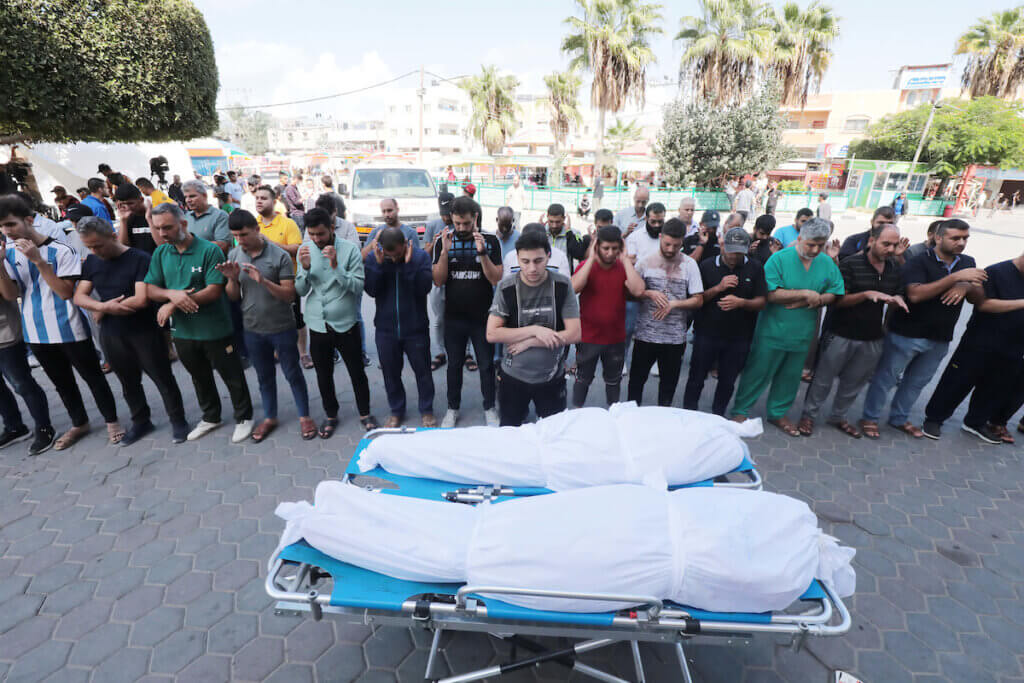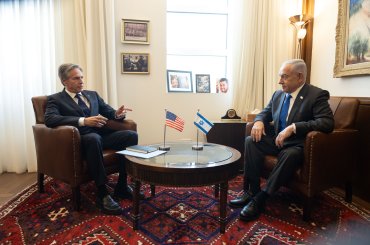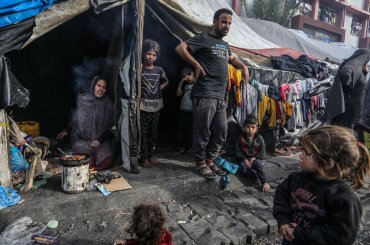Key developments
- Israel denies reports of temporary ceasefire and passage of humanitarian aid into southern Gaza.
- UNRWA warns: no longer able to provide humanitarian assistance as Gaza is running out of water and “running out of life”
- Almost 400,000 displaced people in Gaza are now seeking refuge in UNRWA schools and buildings, including 13,000 of the agency’s staff
- All hospitals in Gaza are running out of fuel, with only 24 hours’ worth of power remaining. Hospitals already facing a shortage of medical equipment, medications, and medical staff, health officials warn
- Since October 7, Israeli forces have arrested hundreds of Palestinians across occupied Palestine. The Addameer prisoners’ rights group warns that the Israel Prison Service is exercising “collective punishment” against Palestinian prisoners, preventing family and lawyers’ visits, and interrupting the supply of water and electricity inside the prisons.
- “We failed,” Israel’s right-wing Finance Minister Bezalel Smotrich admits in the first comment about the Hamas surprise attack on Israeli military bases and settlements in the Gaza Envelope area.
- Israel says it will begin the evacuation of Israelis from 28 towns along the northern border with Lebanon in light of continuing hostilities and exchanges of fire between the Israeli army and Hezbollah.
- As of Monday morning, the number of Palestinian martyrs since Israel began its bombing campaign has reached 2,808, while the number of injured is 10,859. In the occupied West Bank, the Israeli army and settlers killed 57 Palestinians and injured 1,200. Since the start of Operation Al-Aqsa Flood, 1,400 Israelis have been killed, and 3,500 have been injured. An Israeli army spokesperson confirmed that 199 Israeli captives were taken by Hamas.
No ceasefire, no humanitarian aid, Israel says
On Monday, October 16, one week since Israel tightened its siege on Gaza, media reports citing Egyptian security officials began circulating that a temporary ceasefire was going into effect on Monday morning to allow the entry of humanitarian aid into southern Gaza through the Rafah crossing.
Reports also claimed that the temporary ceasefire would go into effect in southern Gaza, where Israel has been corralling Palestinians since Friday, to allow Palestinians with dual nationalities to leave the Strip through Egypt.
But hopes of fuel and essential supplies, as well as safe passage out of Gaza for a few, were quickly dashed when Israel denied ever having agreed to a ceasefire.
Israeli Prime Minister Benjamin Netanyahu’s office issued a statement on Monday, simply saying “There is no ceasefire.” Hamas officials also told Reuters that the Rafah closing remained closed and denied any existence of a ceasefire. Rafah crossing remained shut.
A report by the Guardian, citing “aid officials’,’ said “a few UN lorries carrying oil were allowed into Gaza from Egypt on Monday morning, but the crossing remained closed to most humanitarian deliveries,” including food and other essential supplies. Mondoweiss could not independently confirm if fuel was indeed allowed into the Gaza Strip on Monday.
The lack of a ceasefire was confirmed as Israeli airstrikes continued to pound the Gaza Strip Monday, including southern Gaza, where tens of thousands of Gazans have sought refuge since the weekend, when Israel ordered more than a million Palestinians from northern Gaza to move to the South.
Hospitals may turn into morgues
A temporary ceasefire to allow humanitarian aid into Gaza, if true, would have come at a crucial time on Monday.
All hospitals in Gaza are facing dire conditions and operating while Israeli forces continue to bomb residential buildings and infrastructure in the Palestinian enclave on the 10th day of the Israel-Palestine war.
Health officials said that hospitals are affected by the shortage of water in the Gaza Strip. The electricity is cut off, and hospitals have fuel capacity for only 24 hours to generate power supply and operate.
The WHO issued another warning Monday, saying Gaza has “24 hours of water, electricity and fuel left”, before “a real catastrophe” happens.
But hospitals across Gaza say they’ve already reached catastrophic conditions. Hospital yards and their vicinity across Gaza have become places for thousands of Palestinians to escape Israeli bombardment.
Dr. Mohamed Kandil, director of the emergency department at Naser Hospital in Khan Younis, said hospitals are dealing with a non-stop flow of injured civilians, and bed capacity in hospitals reached its limits, after already being expanded several times.
“In the last hour, we received 60 wounded civilian patients. That is one patient per minute. This is a very catastrophic situation,” Kandil told Al Jazeera Monday.
In addition to dangerously low levels of fuel and medical supplies, hospitals in Gaza are also under threat of Israeli bombardment, with the military ordering the evacuation of close to two dozen hospitals and medical centers across the strip. The World Health Organization (WHO) said that such forced evacuation “may amount to a violation of International Humanitarian Law.”
The collapse of the health sector in Gaza wouldn’t just impact the thousands of emergency patients affected by Israeli airstrikes, but also patients who need regular check-ups or emergency operations, such as kidney and diabetic patients. The UN warned on Monday that almost 50,000 women in Gaza could find it impossible to obtain essential health services, and that more than 5,500 women are expected to give birth next month.
Dominic Allen, United Nations Population Fund representative for Palestine, told CNN: “Imagine going through that process in those final stages and your last trimester before giving birth, with possible complications, without clothing, without hygiene, support and not sure about what the next day, next hour, next minute will bring for themselves and for their unborn child.”
The International Committee of the Red Cross (ICRC) painted a bleak picture of what would await Gaza’s hospitals if the fuel and electricity shortage continues.
“Hospitals in Gaza risk turning into morgues without electricity,” ICRC said.
Over 1,000 people currently remain missing in Gaza since the start of the Israeli campaign. It is believed that they are all stuck under the rubble caused by the destruction of Israel’s airstrikes. Most of them are though to be dead.
Palestinians were seen digging with their hands to reach their relatives. One image could be seen of a person stuck under the rubble who was being offered water through a pipe from a plastic bottle.
The conditions of internally displaced Palestinians have also led to alarming public health concerns, including the danger of dehydration from water shortages and the risk of the spread of cholera and other waterborne diseases remain high. Palestinians have resorted to drinking saline waters from agricultural wells.
This development comes after the last functioning seawater desalination plant in the Gaza Strip had run out of fuel. Philippe Lazzarini, the UNRWA Commissioner-General, warned that “It has become a matter of life and death. It is a must; fuel needs to be delivered now into Gaza to make water available for 2 million people.”
On 8 October, Israel’s Defence Minister Yoav Gallant said he would cut electricity, fuel, and water from Gaza until Israeli captives taken by Hamas are released.
As Israel amasses approximately 300,000 soldiers for a potential ground invasion, the Israeli army has warned 1.1 million Palestinians in northern Gaza to evacuate to the south, stoking fears that Israel is preparing for a second Nakba and a wide-ranging ethnic cleansing operation.
However, thousands of Palestinians remained in the area on Monday afternoon, and residents of Beit Hanoun ignored Israel’s warning to evacuate. Israel also dropped leaflets on neighborhoods across the northern strip with those same evacuation orders.
On Monday morning, Israel said that it would resume the supply of water to Gaza, but Hamas officials and Gaza residents have said that the water remains cut off in most areas in the north. Hind Al-Khoudary, a Palestinian journalist reporting from Al-Aqsa Hospital in Dier al-Balah, said that this is deliberate, as Israel is trying to force people into continuing to move south to access water.
Mass arrests in West Bank and Jerusalem
Israel has arrested almost 600 Palestinians in the West Bank, Jerusalem, and ‘48 occupied Palestine, six of them children, between October 7 and October 15, according to the Addameer prisoners’ rights group.
On Sunday night, Israel arrested 70 Palestinians, including two journalists; according to Wafa News Agency, 28 of them were in Nablus, Ramallah, and Bethlehem.
Prior to the war on Gaza, 5,200 Palestinian prisoners were being held in Israeli jails. Addameer said that Israel is carrying out mass arbitrary arrests while subjecting Palestinian prisoners to collective punishment. According to Addameer, Israeli forces raided homes during the night in the past week, and vandalized the objects in properties beyond repair, threatening detainees and their families with death and using excessive violence.
The number of prisoners is expected to rise.
Israel Prison Service (IPS) also cut off the electricity for four days on Palestinian prisoners in the notorious Naqab desert prison. In Nafha, Ramon, and Ofer prisons, Israeli jailers interrupted the supply of water and electricity.
Family and lawyers’ visit were banned, and canteens remained closed, keeping the prisoners relying on “two small and poor quality meals.” Hamas members were isolated from other prisoners.
Addameer said that these escalations are happening due to “the international community’s silence regarding the occupation’s crimes committed over the years,” and the “absence of any form of accountability.”
Mondoweiss spoke to Palestinians in occupied Jerusalem, who said that on Sunday Israeli forces placed concrete blocks at the entrances of several Palestinian neighborhoods and towns in Jerusalem, including al-‘Issawiya, Sur Baher, and Jabal al-Mukabbir.
Since October 7, Israel has deployed combat units throughout the streets of the Old City of Jerusalem, while residents told Mondoweiss that the occupation’s municipality stopped collecting trash in some neighborhoods, causing it to pile up.
Video footage of Israeli soldiers harassing a Palestinian shopkeeper in Jerusalem and asking him to hand them his phone and open it was widely shared on social media, but Mondoweiss could not independently verify the date and location in which the video took place. However, in another widely shared video, an Israeli police officer was filmed interrupting and intimidating Al-Araby TV correspondent Ahmad Darawsheh while he was live on air. The officer can be seen telling Darawsheh, “I don’t care if you are on live, you better be saying good things.”
“All these Hamas should be slaughtered, am I clear?” he yelled at the journalist before shouting: “We’ll turn Gaza to dust. Dust!”
“We failed,” admits right-wing minister
Prior to the Al-Aqsa Flood Operation, in which Hamas captured tens of Israeli soldiers and settlers, Israel refused to engage with Hamas in non-direct talks about prisoner exchange. Israeli politicians have been adamant about not allowing another prisoner exchange after what was known as the Wafa al-Ahrar prisoner swap (“Faithful to the free”) in which 1,027 prisoners were released in exchange for captured Israeli soldier Gilad Shalit in 2011.
Since then, analysts say that Israeli forces resorted to enacting the 1980s “Hannibal Code,” which is a strategy of allowing the killing of Israelis or putting them at risk to avoid having to negotiate over them, although the code has not been officially explained.
On Monday, Israeli army spokesperson Daniel Hagari said that the government spoke to the families of 199 Israeli captives and 291 dead soldiers.
“We are focusing our efforts on the issue of the abductees as a top national priority. Our attacks are based on intelligence. We are making a supreme effort to understand where the abductees are in Gaza. We will not carry out an attack that would endanger our people,” Hagari said, according to Hebrew channel Kan.
Israel released on Monday the name of a 29-year-old policeman who was killed in the fighting in Kibbutz Be’eri.
Bezalel Smotrich, a settler leader and the Finance Minister in Prime Minister Benjamin Netanyahu’s right-wing government, admitted that Israel had failed in a media conference on Sunday evening.
Smotrich did not answer about resignation but said there will be time for “soul-searching” and “perhaps score-settling.”
“I take responsibility for what has happened and what will happen. We have to admit with pain and with a bowed head, we failed,” Smotrich said.
“The country’s leadership and the security system failed to maintain the security of our people.”
Smotrich suggested that the Israeli government would look into the 2005 Gaza Disengagement, in which Israel dismantled its illegal settlements in the Gaza Strip, and into the 1993 Oslo Accords, when the PLO signed a peace deal with Israel to pave the way for a two-state solution.
On Monday, the Israeli army said it is going to evacuate 28 settlements two kilometers away from the border with Lebanon. Settlers from Metula, Shetula, and Avivim, who saw an exchange of fire with fighters from Hezbollah and Hamas, will be sent to state-subsidized guest houses, Kan channel reported.
Ione Belarra, Spain’s Minister of Social Rights, vowed on Monday to take Netanyahu to the International Criminal Court (ICC) for war crimes.
“Using the horrific murders of Israeli civilians by Palestinian armed factions as an excuse to justify Israel’s crimes in general and the massacre in Gaza in particular is unacceptable,” Belarra, the leader of Spain’s left-wing Podemos party, said.
“We ask our partner, the Socialist Party, to work together to present on behalf of the government of Spain a petition to the prosecutor’s office of the International Criminal Court to investigate the war crimes committed in Palestine by Netanyahu, as was done recently in the case of the Spanish aid worker murdered in the Ukrainian war, as well as those perpetrated by Hamas in Israel and occupied territories against the civilian population,” she said.
Karim Khan, the ICC chief prosecutor, said, “It’s horrendous what’s going on, what we’re seeing on our television screens. There has to be a legal process to determine criminal responsibility,” adding that “willful killing, hostage-taking are grave breaches of the Geneva Convention and one has to comply with the law.”



Hamas is responsible for the catastrophe in Gaza, Hamas can end it.
A thought. What would Israel have done if Hamas had only breached the fence in one place and shot up an army post? Bombed the crap out of Gaza for a week is my guess.